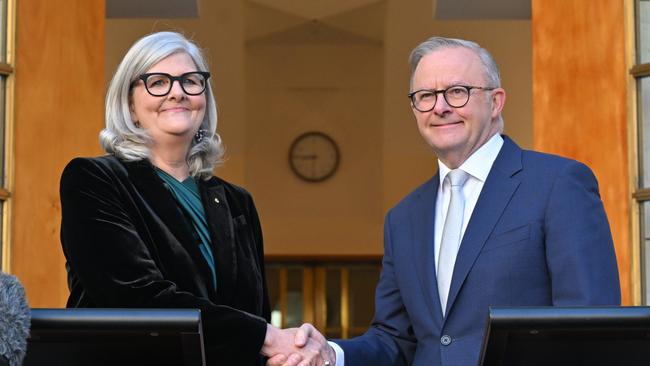Why Labor is loving the corporate end of town
Headlines have proclaimed Labor has decided profit is a dirty word and the government is running an “anti-business” agenda, writes James Morrow.

NSW
Don't miss out on the headlines from NSW. Followed categories will be added to My News.
To listen to big business tell it, things sure ain’t easy under Albanese.
Headlines have proclaimed Labor has decided profit is a dirty word and the government is running an “anti-business” agenda.
Supermarkets, meanwhile, are annoyed they are suddenly going to be made to open the books.
You can almost sense the outrage at the ingratitude of it all: Here we all but clapped in Labor at the 2022 election and tipped wheelbarrows of cash into the Yes campaign, and this is the thanks we get?
But let’s be real here.
For all the corporate complaints that they’re copping it under Albanese, when it wants to be this government can be very close indeed to the private sector.
And this phenomenon, which turns free enterprise into a tool of government policy rather than the market, is far more dangerous than any rhetorical brickbats delivered by our “I fight Tories” prime minister.
How else to explain other stories from the past week or so?

Like the appointment of a prominent professional board member to be the nation’s governor-general, or the announcement of a billion dollars in funding to help some of the nation’s richest investors get a solar industry off the ground?
Or, while we are on the subject, the “warning” from climate change investors that without “certainty” – this is code for taxpayer dollars guaranteeing profits – the funds might not be there to fund the shift to renewables.
From all this, it’s safe to assume a couple of things.
One, it isn’t so much that Albanese is anti-business so much as he simply sees business as a lever with which he can achieve his political projects.
Thriving enterprises are fine, so long as they do what they’re supposed to in terms of climate, the Voice, and whatever the cause du jour is.
And two, too much of the corporate world has decided the fastest route to profit is not innovation or productivity, but the lazy money of government-protected markets and subsidies.
Yet, seen through another lens, here is a prime minister who loves the big end of town, or at least sees co-opting it to remake society in its own image as a more than worthwhile strategy.
And given the nature of our economy, why wouldn’t he?
It’s a strategy made all the more viable by the fact that productivity is in the toilet, importing people is the only thing keeping us afloat, and most of our biggest companies exist as protected species of monopolies and duopolies.
Don’t believe me?
Fine, go start your own toll road company then.
A couple of years ago Forbes magazine ranked the 100 most innovative companies on the planet.
A Russian company snuck in at number 100; not a single Australian company made the list.
In this circumstance, is it any wonder that some of Australia’s richest men and biggest companies are all hoping to get a piece of the government’s $1bn “Solar Sunshot” program?
Much easier to do scoop up government subsidies and be pals with the government than improve efficiency or productivity or start an industry where we could actually have a competitive advantage.
Indeed, the whole renewable economy is so full of lurks and rorts, not the least of which being price guarantees for wind and solar operators paid for, of course, by consumers.
But if you wanted any further evidence of the close ties between Labor and business, just look at the appointment of Sam Mostyn as governor-general.
Would a government that really had a problem with business appoint a woman who harvests high profile board gigs like a North Korean general collects medals?
Of course, you can only imagine the outrage had a Liberal government appointed a business leader like Maurice Newman, who served on the boards of both the ASX and the ABC, to be G-G, but we can dream.
Yet to hear some progressive types on X tell it, Mostyn’s appointment was brilliant, because apparently we needed a good infusion of corporate values in Australian life.
Taken together, the Albanese strategy is a lot more sophisticated than mere Tory-bashing, or returning the economy to the old days before Hawke and Keating and Howard reformed the joint.
Yes, the complaints about industrial relations and the new power of unions and the smashing of small businesses with ever more red tape are all valid.
But corporate Australia has also allowed itself to be co-opted into this, and is now happy to take bouquets (appointments, subsidies) where it can and cop brickbats (highly regulated and unionised workplaces) where it must.
The danger for Australia is that if a Labor government and the corporate sector become ever more closely aligned, the overall economy falls into a death spiral where the state directs investment and discourages competition, leaving everyone but those on top worse off.
.



